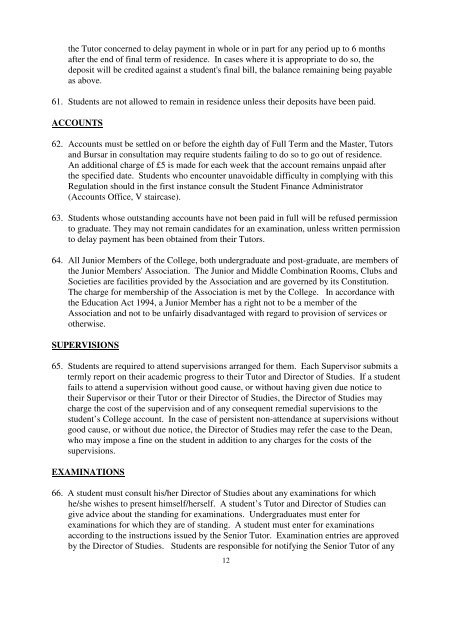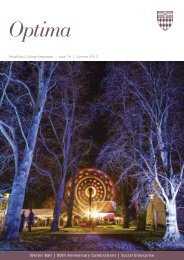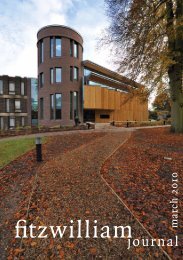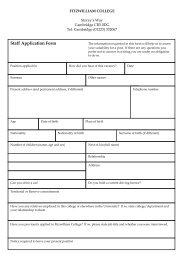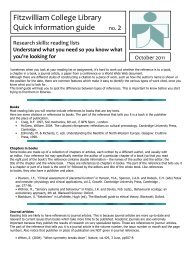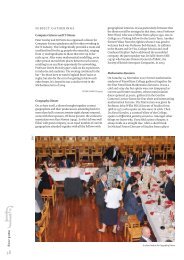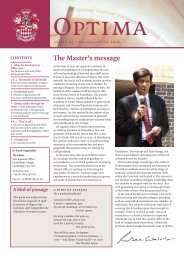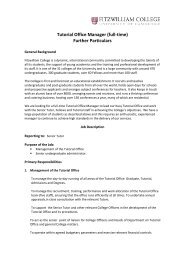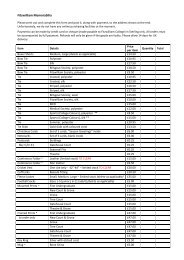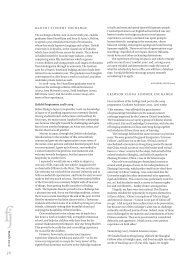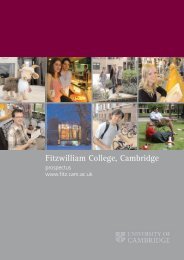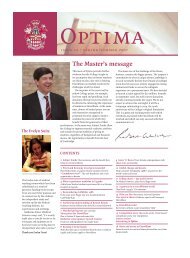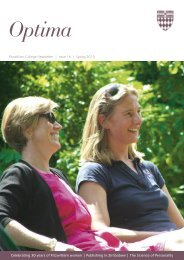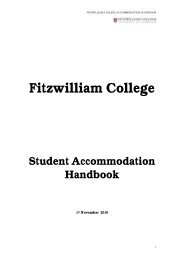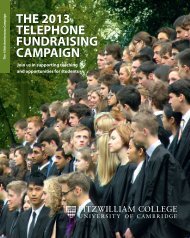here - Fitzwilliam College - University of Cambridge
here - Fitzwilliam College - University of Cambridge
here - Fitzwilliam College - University of Cambridge
Create successful ePaper yourself
Turn your PDF publications into a flip-book with our unique Google optimized e-Paper software.
the Tutor concerned to delay payment in whole or in part for any period up to 6 months<br />
after the end <strong>of</strong> final term <strong>of</strong> residence. In cases w<strong>here</strong> it is appropriate to do so, the<br />
deposit will be credited against a student's final bill, the balance remaining being payable<br />
as above.<br />
61. Students are not allowed to remain in residence unless their deposits have been paid.<br />
ACCOUNTS<br />
62. Accounts must be settled on or before the eighth day <strong>of</strong> Full Term and the Master, Tutors<br />
and Bursar in consultation may require students failing to do so to go out <strong>of</strong> residence.<br />
An additional charge <strong>of</strong> £5 is made for each week that the account remains unpaid after<br />
the specified date. Students who encounter unavoidable difficulty in complying with this<br />
Regulation should in the first instance consult the Student Finance Administrator<br />
(Accounts Office, V staircase).<br />
63. Students whose outstanding accounts have not been paid in full will be refused permission<br />
to graduate. They may not remain candidates for an examination, unless written permission<br />
to delay payment has been obtained from their Tutors.<br />
64. All Junior Members <strong>of</strong> the <strong>College</strong>, both undergraduate and post-graduate, are members <strong>of</strong><br />
the Junior Members' Association. The Junior and Middle Combination Rooms, Clubs and<br />
Societies are facilities provided by the Association and are governed by its Constitution.<br />
The charge for membership <strong>of</strong> the Association is met by the <strong>College</strong>. In accordance with<br />
the Education Act 1994, a Junior Member has a right not to be a member <strong>of</strong> the<br />
Association and not to be unfairly disadvantaged with regard to provision <strong>of</strong> services or<br />
otherwise.<br />
SUPERVISIONS<br />
65. Students are required to attend supervisions arranged for them. Each Supervisor submits a<br />
termly report on their academic progress to their Tutor and Director <strong>of</strong> Studies. If a student<br />
fails to attend a supervision without good cause, or without having given due notice to<br />
their Supervisor or their Tutor or their Director <strong>of</strong> Studies, the Director <strong>of</strong> Studies may<br />
charge the cost <strong>of</strong> the supervision and <strong>of</strong> any consequent remedial supervisions to the<br />
student’s <strong>College</strong> account. In the case <strong>of</strong> persistent non-attendance at supervisions without<br />
good cause, or without due notice, the Director <strong>of</strong> Studies may refer the case to the Dean,<br />
who may impose a fine on the student in addition to any charges for the costs <strong>of</strong> the<br />
supervisions.<br />
EXAMINATIONS<br />
66. A student must consult his/her Director <strong>of</strong> Studies about any examinations for which<br />
he/she wishes to present himself/herself. A student’s Tutor and Director <strong>of</strong> Studies can<br />
give advice about the standing for examinations. Undergraduates must enter for<br />
examinations for which they are <strong>of</strong> standing. A student must enter for examinations<br />
according to the instructions issued by the Senior Tutor. Examination entries are approved<br />
by the Director <strong>of</strong> Studies. Students are responsible for notifying the Senior Tutor <strong>of</strong> any<br />
12


